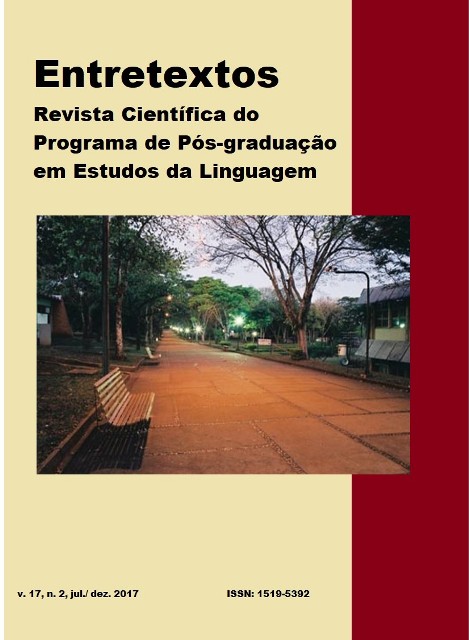The use of metaphors in academic Portuguese by undergraduate students: a corpus-based analysis
DOI:
https://doi.org/10.5433/1519-5392.2017v17n2p231Keywords:
Conceptual Metaphor, Academic Discourse, Academic Portuguese, Corpus LinguisticsAbstract
Research and studies have shown that metaphor plays an important role in academic discourse, which has fueled discussions and reflections about its use (Herrmann, 2013; Gianonni, 2009; Gibbs, 2008; Stefanowitsch; Gries, 2006). Research on this phenomenon is still very incipient concerning Portuguese academic discourse, making necessary a study that investigates the use of metaphors in this sense. Considering this scenario, this research aims to analyze and discuss the use of metaphors in academic Portuguese, in order to promote a characterization of this type of genre, as well as to assist native speakers of Brazilian Portuguese and Portuguese as an additional language in the future. Assuming the Cognitive Linguistics perspective, which understands that the conceptual system of the human being is fundamentally metaphorical in nature (LAKOFF; JOHNSON, 1980), we analyzed a corpus consisting of academic articles published by undergraduate students (native speakers of Brazilian Portuguese) from a university a private university of the South of Brazil. The corpus comprises 30 final papers from two different areas: Communication and Computer Science. From the analysis performed, we could observe that these areas seem to use the metaphors in a differentiated way, with distinct characteristics in each of them.
Downloads
References
BERBER SARDINHA, Tony. Análise de metáfora em corpora. Ilha do Desterro: A Journal of English Language, Literatures in English and Cultural Studies, Florianópolis, n. 52, p. 67-199, jan./jun, 2007.
BIBER, Douglas. Variation across speech and writing. Cambridge: Cambridge University Press, 1988.
BIBER, Douglas et al. The Longman Grammar of Spoken and Written English. London: Longman, 1999. CAMERON, Lynne. Metaphor in educational discourse. London: Equinox, 2003.
FERREIRA, Aurélio Buarque de Holanda. Novo Dicionário Eletrônico Aurélio. v 1.0. Curitiba: Positivo, 2009.
FREITAS, Valéria Simões; BEZERRA, Benedito Gomes. O Papel da Metáfora em Textos Acadêmicos: o artigo científico em cena. In: JORNADA NACIONAL DO GRUPO DE ESTUDOS LINGUÍSTICOS DO NORDESTE, 24., 2012, Natal. Anais ... Natal: EDUFRN, 2012.
GIANONNI, Davide Simone. Disciplinary Values in English Academic Metaphors. Linguistica e Filologia, Bergamo, p.173-191, 2009.
GIBBS, Raymond. The Poetics of mind: Figurative thought, language and understanding. Cambridge: Cambridge University Press, 1994. GIBBS, Raymond. Metaphor and thought: The state of the art. In: GIBBS, Raymond. (Ed.). The Cambridge Handbook of Metaphor and Thought. Cambridge: Cambridge University Press, 2008. p.3-16.
HERRMANN, Julia Berenike. Metaphor in academic discourse Linguistic forms, conceptual structures, communicative functions and cognitive representations. PhD, Faculty of Arts, VU University Amsterdam, The Netherlands, 2013.
HOUAISS, Antonio. Dicionário eletrônico Houaiss da língua portuguesa. V. 1.0. Rio de Janeiro: Objetiva, 2009.
HYLAND, Ken; BONDI, Marina. (Ed.). Academic Discourse Across Disciplines. Bern: Peter Lang, 2006.
KÖVECSES, Zoltan. Metaphor: a practical introduction. Oxford: Oxford University Press, 2010.
LAKOFF, George; JOHNSON, Mark. Metaphors we live by. Chicago: University of Chicago Press, 1980.
LAKOFF, George; JOHNSON, Mark. Afterword, 2003. In: LAKOFF, George; JOHNSON, Mark. Metaphors we live by. Chicago: University of Chicago Press, 2003. p. 243-276.
LAKOFF, George; TURNER, Mark. More than Cool Reason: A Field Guide to Poetic Metaphor. Chicago: Chicago University Press, 1989.
LOW, Graham. Metaphor and education. In: GIBBS, Raymond (Ed.). The Cambridge handbook of metaphor and thought. Cambridge: Cambridge University Press, 2008. p. 212-231.
MEDLIK, S.; INGRAM, Hadyn. Introdução à Hotelaria: Gerenciamento e Serviços. Rio de Janeiro: Editora Campus, 2002.
SEMINO, Elena. Metaphor in discourse. Cambridge: Cambridge University Press, 2008. SIQUEIRA, Maity et al. Metaphor identification in a terminological dictionary. Ibérica ,Madrid, v. 17, p. 157-174, 2009.
STEEN, Gerard; GIBBS, Raymond W. Introduction. In: GIBBS, Raymond W.; STEEN, Gerard (Ed.). Metaphor in cognitive linguistics. Amsterdam: Benjamins, 1999.
STEFANOWITSCH, Anatol; GRIES, Stefan Th. (Ed.). Corpus-based approaches to metaphor and metonymy. Berlin: Mouton de Gruyter, 2006.
TAPSCOTT, Don; WILLIAMS, Anthony D. Wikinomics: como a colaboração em massa pode mudar o seu negócio. Rio de Janeiro: Nova Fronteira, 2007.
TEMMERMAN, Rita. Towards New Ways of Terminology Description: The Sociocognitive Approach. Amsterdam: John Benjamins, 2000.
Downloads
Published
How to Cite
Issue
Section
License
Copyright (c) 2017 Entretextos

This work is licensed under a Creative Commons Attribution 4.0 International License.
Entretextos adota a Licença Creative Commons Attribution 4.0 International, portanto, os direitos autorais relativos aos artigos publicados são do/s autor/es.
Sob essa licença é possível: Compartilhar - copiar e redistribuir o material em qualquer suporte ou formato. Adaptar - remixar, transformar, e criar a partir do material, atribuindo o devido crédito e prover um link para a licença e indicar se mudanças foram feitas.























